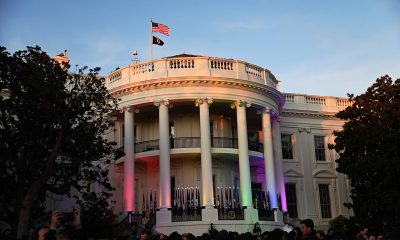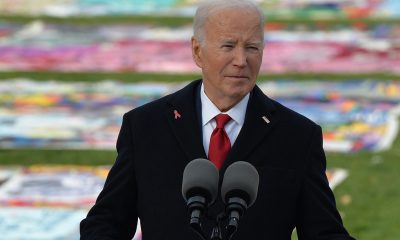Asia
Chinese activist continues fight for LGBTQ, intersex rights from U.S.
Yanhui Peng successfully challenged ‘conversion therapy’ clinic
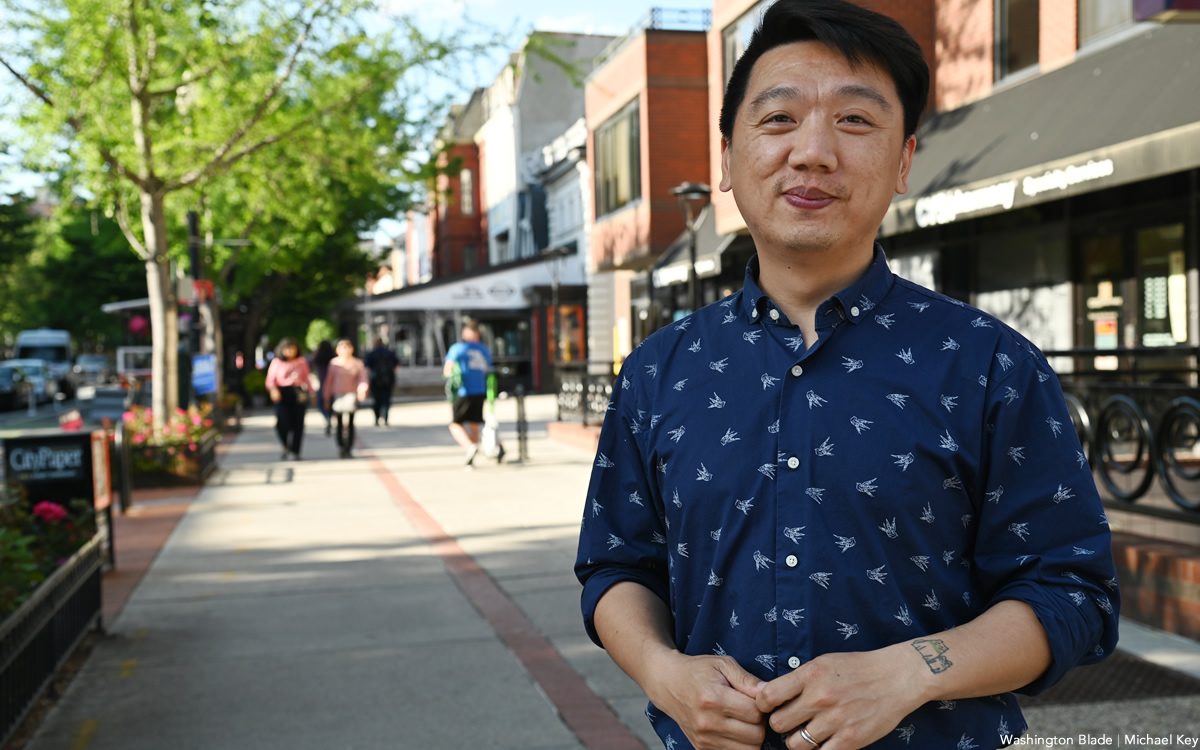
Yanhui Peng, co-founder of LGBT Rights Advocacy China, a Chinese advocacy group, in 2014 sought to expose doctors and therapists who practice so-called conversion therapy.
He saw an ad on Baidu, a Chinese search engine, for a therapist in the city of Chongqing who used electroshock therapy to “cure” a person’s homosexuality. The therapist charged patients $5,000 (34,506 Chinese yuan) for 30 treatments.
“They will make sure you will be straight,” Peng recalled to the Washington Blade during a May 19 interview in D.C.
Peng decided to receive a treatment, which cost $90 (621.12 Chinese yuan) and lasted an hour.
“He asked me to lay down on a sofa and he started to hypnotize me,” recalled Peng. “He asked me to close my eyes, calm down, breathe in, breathe out.”
Peng described the room in which he was as “small” and “very uncomfortable.”
“He then started to ask me to think about a situation, having sex with men, and see if I have some mental or physical reaction to move my fingers … he didn’t wait until I moved my finger. He just used the electroshock equipment. He electroshocked me on my arms,” he said. “It wasn’t so strong, but it was scary because it was sudden.”
Peng said he received two additional electroshock treatments before he left the clinic. Peng kept his receipt and included it in a complaint against the therapist that he filed in court.
A judge ruled in his favor, noting homosexuality is not a disease and “gay cure advertisement is illegal.” The ruling is the first time a judge in China ruled in favor of LGBTQ and intersex rights.
“Luckily we won the case,” Peng told the Blade. “It was a surprise.”
Peng said the ruling inspired LGBT Rights Advocacy China to file additional cases.
One case involved a 37-year-old man whose parents forcibly admitted him to a mental hospital for 19 days because he is gay. Peng told the Blade that personnel forced the man to take medication and punished him if he refused.
Another case involved a kindergarten teacher who was fired after he posted gay-specific news on social media. LGBT Rights Advocacy China also represented a lesbian couple from China who had a child after they legally married in Los Angeles.
LGBT Rights Advocacy China shut down in November 2021 amid increased government restrictions against NGOs and what the Associated Press described as “social activism.”
Peng, who currently studies at Yale University, continues to champion LGBTQ and intersex rights in China. Peng, among other things, speaks with IBM and other companies with offices in China about the need to support their LGBTQ and intersex employees.
“In China, they focus on economic development and there are so many international companies,” he said. “More and more companies realize there is a pink dollar.”
‘I just persuaded myself that I’m not gay’
Peng, 39, grew up in a small town about 180 miles outside of Guangzhou, a city in southern China that is close to Hong Kong. Peng was still in the closet when he enrolled in a Guangzhou university in 2002.
“It was my first time knowing the term homosexuality,” he said, noting he learned about homosexuality on the internet that had just begun to become widely available in China. “It was so negative because when I searched the term ‘tong zhi’ (gay in Chinese) it all appeared abnormal, [gay people] have sex with everybody and get diseases like HIV. I was scared. I thought it wasn’t ok.”
Peng said he went to his university’s library to research homosexuality. He told the Blade that most of the books he read “didn’t mention homosexuality” and the few that did “said homosexuality is a disease.”
“I couldn’t even accept myself,” he said. “I just persuaded myself that I’m not gay.”
Peng said he didn’t talk about his homosexuality with his family, in part, because his classmates bullied him because he was “kind of feminine.” Peng told the Blade that he was afraid to use the bathroom in school because he “was afraid that when I would go to the toilet people would laugh at me.”
Peng said he “persuaded myself to fall in love with other girls” when he was a university student.
He told the Blade that he was still in the closet when he began to work for an NGO and “started to realize there were LGBT groups in Guangzhou.”
“The community was there, but I was so scared to join them,” said Peng. “I tried to be a volunteer and persuade myself that I’m not gay.”
Peng was 27 in 2010 he finally mustered the courage to come out to a colleague on whom he had a crush while they were participating in a two-day hiking event. The man was straight, but Peng told the Blade that his reaction to his homosexuality was “so positive.”
“He encouraged me a lot,” said Peng. “I forgot to tell him that I love him.”
“After that I started to come out to everybody,” he added.
Peng in 2013 quit his job and co-founded LGBT Rights Advocacy China. He filed suit against the Chongqing conversion therapy clinic the following year.
Peng’s parents still did not know about his homosexuality, but they did watch him on Chinese television after the judge ruled in his favor.
“The national media talked about our case,” he said. “All my relatives called them and asked what happened, what happened to your son. I think they got a lot of pressure. They presented not to know and haven’t discussed this topic with me. They know … I think they don’t accept it. They can’t control me because I live so far away.”
Peng over the summer married his husband in Utah.
Government censorship, COVID-19 lockdowns among community challenges
China decriminalized homosexuality in 1997, but the government has banned depictions of same-sex relationships and “sissy men” in the media. Transgender people who are at least 18 can legally change their gender after the undergo sex-reassignment surgery.
The State Department’s 2021 human rights report cites reports of discrimination and harassment based on sexual orientation and gender identity. The report also notes LGBT Rights Advocacy China’s decision to shut down.
Peng told the Blade that the Chinese government’s sweeping lockdowns to prevent the spread of COVID-19 have had a serious impact on LGBTQ and intersex people.
He noted NGOs in Wuhan worked with local authorities to provide medications to people with HIV/AIDS when the city was locked down from Jan. 23, 2020, until April 8, 2020. Peng said they also sought to hold virtual meetings in which LGBTQ and intersex people could participate from their homes.
Pride Month events took place in Shanghai in June 2020, but the city was under a strict COVID-19 lockdown when Peng spoke with the Blade.
“It’s kind of difficult,” he said.
Hong Kong had been scheduled to host the Gay Games in November, but the pandemic prompted organizers to postpone them to 2023. The Federation of Gay Games, which organizes the quadrennial event, earlier this year announced Hong Kong will co-host it with Guadalajara, Mexico.
Gigi Chao, co-founder of Hong Kong Marriage Equality, late last year during an interview with the Blade dismissed calls to boycott the 2023 Gay Games over China’s human rights record.
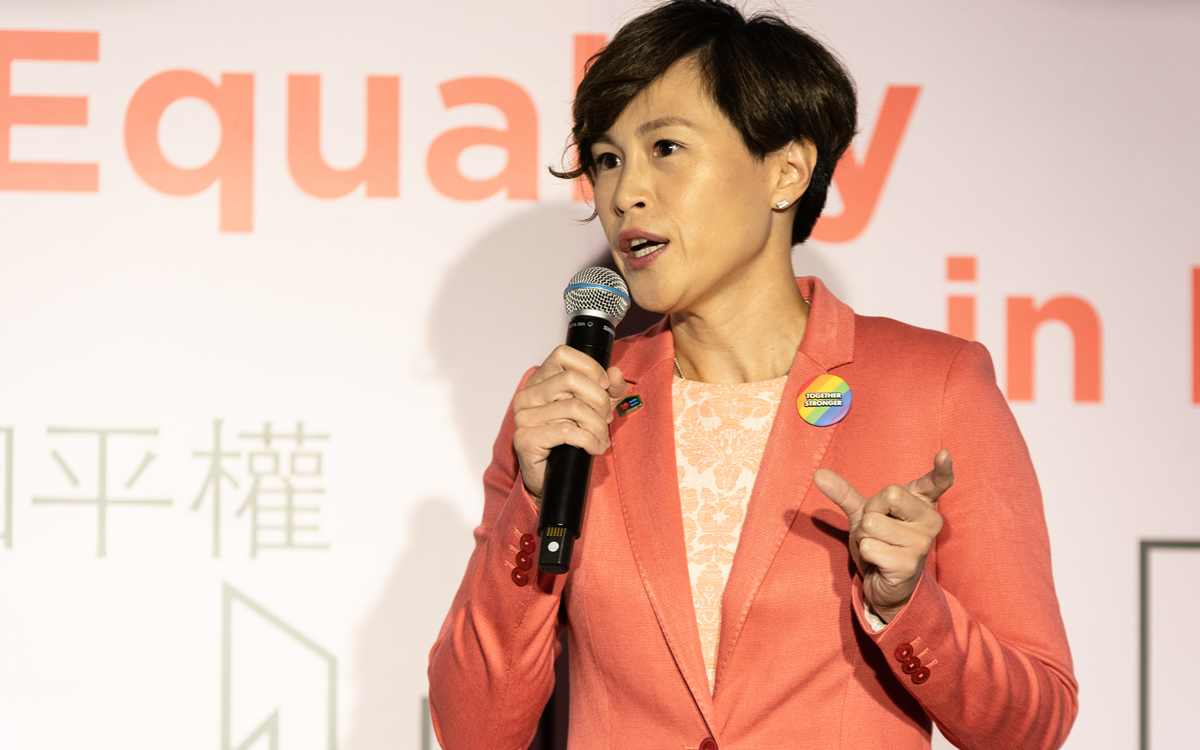
Peng said he and other activists in China “were so happy that Hong Kong was going to organize” the Gay Games, but he did not specifically discuss the human rights concerns. Peng nevertheless said he continues to support the event’s organizers in Hong Kong.
“I hope they won’t give up,” he said. “It’s a good opportunity for more businesses because there are a lot of international businesses in Hong Kong to show support. I think they should speak out to support them.”
Asian Development Bank LGBTQ, intersex safeguards ‘quite important’
Chantale Wong, the U.S. director of the Asian Development Bank who is the first openly lesbian American ambassador, was born in Shanghai in 1954. Her parents in 1960 placed her in the bottom of a boat that brought her and her grandmother to Hong Kong, which was a British colony at the time.
Peng praised Wong and her ambassadorship. He has also testified in support of LGBTQ and intersex-specific safeguards for the Asian Development Bank.
“It’s quite important because ADB invests $2 billion every year in China,” said Peng. “If there’s an LGBT safeguard, these projects can be LGBT-inclusive, friendly … can have some benefit for LGBT people.”
Myanmar
LGBTQ advocacy group joins Myanmar earthquake relief effort
March 28 quake killed thousands, devastated country’s second-largest city

A powerful earthquake that rocked Myanmar on March 28 unleashed devastation across the central part of the country.
The U.S. Geological Survey measured the quake at 7.7, and pinpointing its epicenter roughly 10 miles west of Mandalay, the country’s second-largest city. A 6.4-magnitude aftershock jolted the area 12 minutes later, compounding the destruction and deepening the crisis for a nation already strained by conflict.
The earthquake struck with terrifying intensity near its epicenter, wreaking havoc on Mandalay and the nearby city of Sagaing.
Mandalay, a bustling city of approximately 1.5 million residents, bore the brunt of the destruction. Among the most striking losses was the 12-story Sky Villa Condominium, which collapsed, leaving scores trapped beneath the wreckage. Rescue workers scrambled to pull survivors from the rubble, but the rising death toll underscored the tragedy’s magnitude.
In Sagaing, which is located closer to the epicenter, more than 70 percent of buildings sustained damage. The Ava Bridge, an essential artery spanning the Irrawaddy River, collapsed, cutting off a critical connection to Mandalay. The earthquake’s shallow depth of less than seven miles amplified its power, reducing homes, temples, and schools to rubble.
The earthquake’s death toll continues to climb, with at least 3,649 confirmed dead, more than 5,000 injured, and approximately 145 people missing. Amid the widespread devastation, questions loom about the impact on vulnerable populations. The Washington Blade reached out to Colors Rainbow, an organization advocating for LGBTQ rights in Myanmar, to understand how the crisis has affected one of the nation’s most marginalized communities.
Colors Rainbow Executive Director Hla Myat Tun spoke about how his organization is working to address the crisis faced by Myanmar’s LGBTQ community in the aftermath of the earthquake.
Colors Rainbow has implemented a system of multipurpose cash transfers, directing funds to local LGBTQ partner organizations. These grassroots partners, in turn, provide essential support to affected individuals that includes emergency cash assistance, food, non-food items, clean water, and basic emotional support tailored to the immediate needs of their communities.
“We estimate that around 500–800 LGBTQ individuals have been impacted in the affected areas, particularly in Mandalay Region, Sagaing Region, and southern Shan state,” said Hla Myat Tun. “So far, we have been able to directly assist around 80–100 LGBTQ individuals.”
Hla Myat Tun told the Blade that Colors Rainbow is actively gathering data to assess the specific challenges that LGBTQ people are facing in the aftermath of the earthquake.
Preliminary observations, he noted, point to heightened vulnerability among LGBTQ people, driven by social exclusion and limited access to mainstream humanitarian aid. Hla Myat Tun, however, emphasized more comprehensive information is necessary to fully understand the scope of their needs and vulnerabilities in this crisis.
“We are partnering with international LGBTQ and feminist organizations that focus on displaced communities,” said Hla Myat Tun. “These partners provide emergency funds, and we coordinate with local LGBTQ groups to deliver aid directly to affected individuals on the ground.”
Addressing reports of military restrictions on humanitarian aid, Hla Myat Tun explained how Colors Rainbow is managing to reach LGBTQ people who are in conflict zones and areas the military junta controls. Hla Myat Tun highlighted the importance of the organization’s trusted local LGBTQ partners, who are embedded in these regions. Their presence and established networks, he said, are vital in navigating restricted areas and ensuring that aid reaches the LGBTQ people who are most in need.
Hla Myat Tun also provided insight into how Colors Rainbow is tailoring its relief efforts to meet the LGBTQ community’s specific needs.
He said his organization is gathering information directly from LGBTQ people through close coordination with its local partners, relying on both formal and informal communication channels. Hla Myat Tun told the Blade his team conducts daily check-ins via quick telephone calls, ensuring a continuous flow of information to guide their response efforts despite limited internet access, electricity and other challenges.
“Our approach is collaborative — we set strategies and share responsibilities to respond flexibly and safely, based on the rapidly changing local context,” he said. “Personal stories are being documented, but for security reasons, we are cautious about sharing them publicly.”
When asked whether staff or volunteers had harassment, discrimination, or violence while delivering aid — a concern given the precarious legal and social climate for LGBTQ people in Myanmar — Hla Myat Tun said there have been no reported incidents thus far.
“So far, we haven’t received any reports from our staff or local partners about harassment or violence while delivering aid,” he noted, emphasizing Colors Rainbow remains vigilant and has implemented robust safety protocols to protect all involved.
Colors Rainbow relies primarily on funding from international LGBTQ-focused partners. He noted, however, humanitarian funding specifically dedicated to LGBTQ communities remains vastly under-resourced, relative to the pressing needs on the ground. Hla Myat Tun said this shortfall severely limits the scale and reach of Colors Rainbow’s efforts.
“While Myanmar’s legal framework remains outdated, societal attitudes — especially during the civilian government — have shown signs of progress,” said Hla Myat Tun. “We have seen positive change thanks to the work of local LGBTQ organizations.”
“In the current crisis, many communities are working together despite legal barriers. However, in areas without LGBTQ-led organizations, inclusive humanitarian responses are still lacking,” he added. “There’s an urgent need for international humanitarian actors to understand and implement LGBTQ-inclusive practices in Myanmar.”
When asked about long-term strategies to support the recovery and resilience of LGBTQ communities as Myanmar rebuilds, Hla Myat Tun affirmed Colors Rainbow is deeply committed to fostering resilience. The organization’s initiatives include leadership development, community empowerment through training and workshops, sub-granting programs, and organizational development support. He also highlighted Colors Rainbow’s advocacy for LGBTQ-inclusive policies and collaboration with ethnic groups to promote an inclusive federal democracy, and specifically thanked Outright International, a global LGBTQ and intersex rights group, for “amplifying our work.
“This kind of international attention shines a spotlight on the challenges LGBTQ communities in Myanmar are facing and helps open doors for more support,” Hla Myat Tun told the Blade. “It also boosts visibility and solidarity, both locally and globally, which we deeply appreciate.”
India
LGBTQ poets included in India’s premier literary festival
Sahitya Akademi seen as mirror of government’s cultural agenda

India’s premier literary institution on March 7 announced it would allow LGBTQ poets to participate in its marquee Festival of Letters in New Delhi.
The Sahitya Akademi, often seen as a mirror of the government’s cultural agenda, for the first time allowed these poets into a high-profile poetry reading at the Rabindra Bhavan. They shared the stage with more than 700 writers across 50 languages.
Culture and Tourism Minister Gajendra Singh Shekhawat kicked off the Festival of Letters with Mahesh Dattani, the acclaimed English-language playwright famed for his provocative works, as the main guest. Dubbed Asia’s grandest literary gathering, the Sahitya Akademi took place over six days under the “Indian Literary Traditions” theme.
The 2025 Festival of Letters showcased a sweeping range of voices — young writers, women writers, Dalit authors from marginalized castes, Northeast Indian scribes, tribal poets, and LGBTQ poets — cementing its reputation as a literary kaleidoscope.
Kalki Subramaniam, a leading transgender rights activist and author, on March 9 chaired a literary session titled “Discussion on Literary Works of LGBTQ Writers in the 21st Century,” which spotlighted contemporary queer voices.
“It was enriching to listen to the profound thoughts of LGBT writers from various parts of the country in their speeches,” said Subramaniam. “The session was particularly memorable with the participation of A. Revathi Amma from Tamil Nadu, Reshma Prasad from Bihar, Sanjana Simon from New Delhi, and Devika Devendra Manglamukhi and Shivin from Uttar Pradesh and Aksaya K Rath from Orissa.”
Subramaniam discussed how global politics shape gender rights and the persistent erasure of trans identity, urging a unified push for solidarity within the LGBTQ community. She stressed the vital need to elevate queer works and writers, casting their voices as essential to the literary vanguard.
“It was a pleasure to meet great writers from around the country in the festival as well as meet my writer activist friends Sajana Simon and Revathi Amma after a long time,” said Subramaniam.

The government on March 12, 1954, formally established the Sahitya Akademi. A government resolution outlined its mission as a national entity tasked with advancing Indian literature and upholding rigorous literary standards; a mandate it has pursued for seven decades.
The Sahitya Akademi in 2018 broke ground in Kolkata, hosting the country’s first exclusive gathering of trans writers, a landmark nod to queer voices in Indian literature.
Hoshang Dinshaw Merchant, India’s pioneering openly gay poet and a leading voice in the nation’s gay liberation movement, on March 9 recited a poem at the Festival of Letters, his verses carrying the weight of his decades-long quest for queer recognition. He later thanked the session’s chair for welcoming the community, a gesture that underscored the event’s third day embrace of diverse voices.
The Sahitya Akademi in 2024 honored K. Vaishali with the Yuva Puraskar for her memoir “Homeless: Growing Up Lesbian and Dyslexic in India,” a raw account of navigating queerness and neurodivergence. Vaishali in a post-win interview reflected on India’s deep-seated conservatism around sexuality, noting she wrote from a place of relative safety — an upper-caste privilege that shielded her as she bared her truth. The award, she said, was the Akademi’s indelible seal on her lived experience, a validation no one could challenge.
The Sahitya Akademi’s inclusion of LGBTQ writers in its main program this year jars with the Bharatiya Janata Party-led government’s conservative stance, which, in 2023, opposed same-sex marriage in the Supreme Court, arguing it erodes Indian family values. Yet, under Shekhawat, the Sahitya Akademi’s spotlight on queer voices at the Rabindra Bhavan suggests it could be a tentative crack in a regime typically rooted in tradition.
The Festival of Letters hosted a translators’ meeting on March 10, spotlighting P. Vimala’s 2024 award-winning Tamil translation of Nalini Jameela’s “Autobiography of a Sex Worker,” a work steeped in marginalized voices that include queer perspectives.
This platform gained significant support from the BJP-led government, with Shekhawat securing a 15 percent budget increase to ₹47 crore ($5.63 million) in 2024. In Tamil Nadu state, however, Dravida Munnetra Kazhagam’s Chief Minister Muthuvel Karunanidhi Stalin, has long opposed such cross-linguistic efforts, fearing dilution of Tamil identity amid decades of anti-Hindi sentiment — a tension the Sahitya Akademi’s inclusive showcase sought to bypass.
‘The Akademi is very inclusive and has a friendly festival ambience,” Subramaniam told the Washington Blade.
Japan
Japan’s marriage equality movement gains steam
Nagoya High Court this month ruled lack of legal recognition is unconstitutional
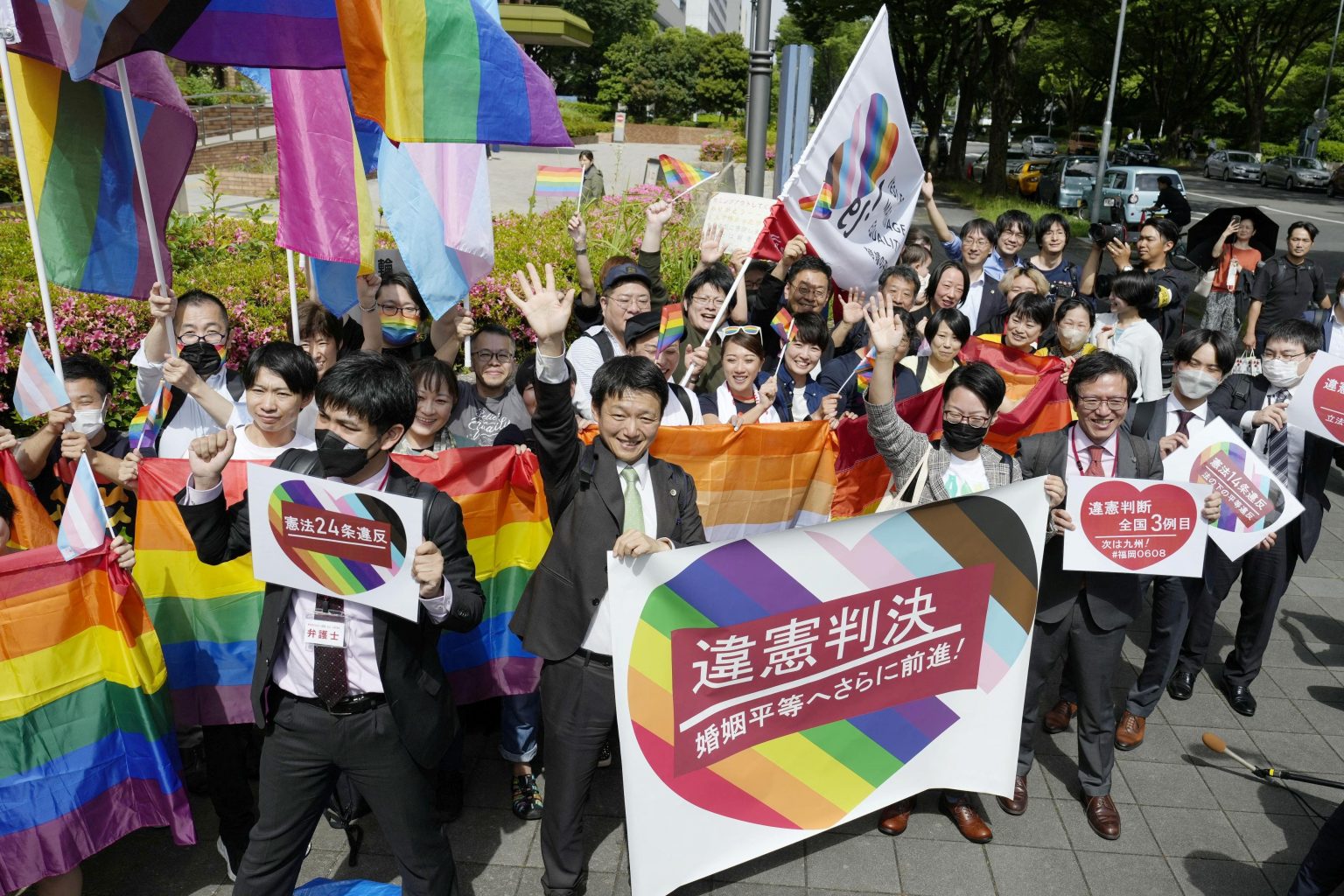
Japan’s Nagoya High Court on March 7 ruled the lack of legal recognition of same-sex marriages violates the country’s constitution.
The plaintiffs argued Japan’s Civil Code and Family Registration Act, which does not recognize same-sex marriages, violates the country’s constitution. They cited Article 14, Paragraph 1, which guarantees equality under the law and prohibits discrimination based on factors that include race, creed, sex, or social status. The plaintiff also invoked Article 24, Paragraph 2, which emphasizes that laws governing marriage and family matters must uphold individual dignity and the fundamental equality of the sexes.
The plaintiffs sought damages of 1 million yen ($6,721.80) under Article 1, Paragraph 1, of the State Redress Act, which provides for compensation when a public official, through intentional or negligent acts in the course of their duties, causes harm to another individual. The claim centered on the government’s failure to enact necessary legislation, which prevented the plaintiff from marrying.
The court noted same-sex relationships have existed naturally long before the establishment of legal marriage. It emphasized that recognizing such relationships as legitimate is a fundamental legal interest connected to personal dignity, transcending the confines of traditional legal frameworks governing marriage and family.
The court further observed same-sex couples encounter significant disadvantages in various aspects of social life that cannot be addressed through civil partnership systems. These include housing challenges, such as restrictions on renting properties, and financial institutions refusing to recognize same-sex couples as family members for mortgages. Same-sex couples also face hurdles in accessing products and services tailored to family relationships. While the court deemed the relevant provisions unconstitutional, it clarified that the government’s failure to enact legislative changes does not constitute a violation under the State Redress Act.
The lawsuit, titled “Freedom of Marriage for All,” brought together a large coalition of professionals, including more than 30 plaintiffs and 80 lawyers. They filed six lawsuits in five courts throughout Japan.
“We filed these lawsuits on Valentine’s Day, Feb. 14, 2019, in Tokyo, Osaka, Nagoya, and Sapporo, and in September of that year in Fukuoka,” noted Takeharu Kato, director of Marriage for All Japan. “Then, in March 2021, the Sapporo District Court handed down the first ruling declaring the current laws unconstitutional, which received extensive worldwide media coverage. Subsequently, the Osaka District Court unfortunately ruled that the current law is constitutional, but among the 10 rulings handed down so far, nine have ruled that not recognizing marriage equality is unconstitutional.”
Kato is a lawyer who is part of the legal team in the Sapporo case. He is also a board member of Marriage for All Japan, a marriage equality campaign.
“The MFAJ (Marriage for All Japan) is fully supporting the lawsuits by publicizing the current status of the trials and the rulings in our websites and social networks, setting up press conferences at the time of the rulings,” Kato told the Washington Blade. “We also make the best of the impact of the lawsuits in our campaign by holding events with the plaintiffs of the lawsuits and inviting them to the rally at Diet (the Japanese parliament) members’ building.”
Kato said the campaign has significantly shifted public opinion, with recent polls indicating more than 70 percent of Japanese people now support marriage equality — up from approximately 40 percent before Marriage for All Japan launched. He also noted 49 percent of Diet members now back marriage equality.
Japan is the only G7 country that does not legally recognize same-sex couples. Taiwan, Nepal, and Thailand have extended full marriage rights to gays and lesbians.
Expressing disappointment, Kato said many Japanese politicians continue to resist marriage equality, despite overwhelming public support. Kato added Marriage for All Japan expects the Supreme Court to rule on their lawsuits in 2016.
“We believe that the Supreme Court will also rule that the current laws are unconstitutional,” he said. “However, the Supreme Court’s ruling alone is not enough to achieve marriage equality under the Japanese legal system. We should put more and more strong pressure on the Diet to legalize marriage equality in Japan as soon as possible.”
Several municipalities and prefectures issue certificates that provide limited benefits to same-sex couples, but they fall short of equal legal recognition.
Prime Minister Fumio Kishida’s government has faced mounting pressure on the issue as public support for marriage equality has surged in recent years. Kishida has yet to push reforms within his own party; encountering fierce opposition from its traditional leadership.
His government in June 2023 passed Japan’s first law addressing sexual orientation and gender identity, aiming to “promote understanding” and prevent “unfair discrimination.” Activists, however, widely criticized the legislation on grounds it fails to provide comprehensive protections or extend marriage rights to same-sex couples.

